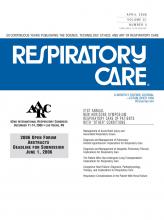Abstract
Lung and kidney function are intimately related in both health and disease. Respiratory changes help to mitigate the systemic effects of renal acid-base disturbances, and the reverse is also true, although renal compensation occurs more slowly than its respiratory counterpart. A large number of diseases affect both the lungs and the kidneys, presenting most often with alveolar hemorrhage and glomerulonephritis. Most of these conditions are uncommon or rare, although three of them—Wegener's granulomatosis, systemic lupus erythematosus, and Goodpasture's syndrome—are not infrequently encountered by respiratory care clinicians. Respiratory complications of chronic renal failure include pulmonary edema, fibrinous pleuritis, pulmonary calcification, and a predisposition to tuberculosis. Urinothorax is a rare entity associated with obstructive uropathy. Sleep disturbances are extremely common in patients with end-stage renal disease, with sleep apnea occurring in 60% or more of such patients. The management of patients with acute renal failure is frequently complicated by pulmonary edema and the effects of both fluid overload and metabolic acidosis. These processes affect the management of mechanical ventilation in such patients and may interfere with weaning. Successful lung-protective ventilation in patients with acute lung injury and renal failure may require modification of hemodialysis in order to combat severe acidemia. Hemodialysisrelated hypoxemia, which was once believed to be the result of pulmonary leukostasis and complement activation, is explained by diffusion of CO2 into the dialysate, with concomitant alveolar hypoventilation in the process of maintaining a normal PaCO2. Like acute lung injury, renal failure is a common complication of critical illness. An increasing body of evidence also supports the notion that the kidneys, like the lungs, are susceptible to injury induced as a result of positive-pressure mechanical ventilation.
- acute renal failure
- chronic renal failure
- hemodialysis
- hypoxia
- physiology
- ventilatory drive
- hypoventilation
- pulmonary-renal syndrome
- ventilator-induced renal injury
Footnotes
- Correspondence: David J Pierson MD FAARC, Harborview Medical Center, 325 Ninth Avenue, Box 359762, Seattle WA 98104. E-mail: djp{at}u.washington.edu.
- Copyright © 2006 by Daedalus Enterprises Inc.







